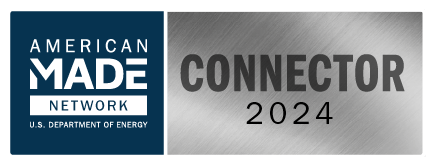By Orla McCaffrey
Does your technology help someone overcome a major hurdle or inconvenience in their daily lives? Is there a large enough market for the product? These were the questions answered by participants in the Koffman Southern Tier Incubator’s second I-Corps Short Course, which wrapped up on Saturday, Feb. 17.
I-Corps is a National Science Foundation (NSF) program designed to help researchers and scientists transition their projects from the lab to the marketplace. Binghamton’s second cohort, consisting of seven local teams, completed the two-week program this weekend.
The short course curriculum introduces participants to the Business Model Canvas, a template used by start-up companies to assess whether there’s a product-market fit. In short, does the product fill an unmet need in the market, and is there enough demand for it?
Identifying the needs of potential customers is an essential part of the canvas, said Tony Frontera, one of the course instructors and an Entrepreneur-in-Residence at Binghamton University’s Office of Entrepreneurship and Innovation Partnerships.
“The first key steps are finding who your targets are and what they value,” Frontera said.
Another essential part of the process is customer discovery — testing your hypothesis about what you think people need by interviewing them. The short course program requires at least 25 interviews of potential customers.
“Through this process, most people find out that they’re at least somewhat off-base with my target customers and what they really wanted,” Frontera said.
But it’s not the end of the road for participants; they can decide to pivot, or modify the product or customer segment to ensure a better product-market fit.
The Office of Entrepreneurship and Innovation Partnerships of Binghamton University initially applied to the National Science Foundation to become an I-Corps site in 2016, but didn’t make the final cut. It took until last year for the grant to get approved to set up the Innovation Binghamton I-Corps Site as a component of the Binghamton Incubator program to be housed in the Koffman Incubator.
“We weren’t quite ready back then, honestly,” Frontera said. “But now we’re starting to get a pipeline; we’re starting to get faculty researchers that are interested in this now. In this cohort, we have seven teams and the majority of them are technology research out of universities.”
The incubator is now one of 86 I-Corps sites around the nation; these locations are designed not just to host short-course programs but serve as a one-stop-shop for mentorship, resources and networking opportunities for budding teams.
Instructing the course alongside Frontera was Brian Bauer, the Entrepreneur-in-Residence at the Southern Tier Startup Alliance, a network of incubators across the region. According to Frontera, teams who participate in I-Corps programming have a better shot at future prosperity.
“The success rate is much higher in terms of applying for future funding, Small Business Innovation (SBIR) grants, or even getting funding and actually commercializing the technology,” he said.
Those who complete the short course are eligible for up to $3,000 in funding from the grant to the Office of Entrepreneurship and Innovation Partnership to perform additional customer discovery on their projects or to cover prototyping expenses. And teams that exhibit a relatively polished business model during the short course program are encouraged to apply to be part of the NSF’s national cohort.
“Being in this cohort entails about seven or eight weeks of work; it’s very, very intense — more so than the short course,” Frontera said. “It also involves up to $50,000 in funding, just for customer discovery.”
Nationwide, more than 1,000 teams have completed the I-Corps program.



